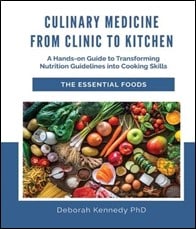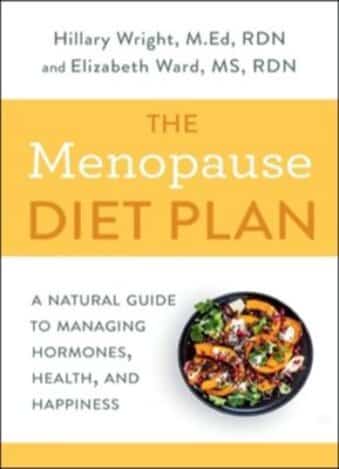
Cynthia just celebrated her 55th birthday and says she is starting to “feel every bit her age”. Her dad has begun having memory issues at age 82, and Cynthia is worried that she may be destined for the same fate. She doesn’t like most vegetables, doesn’t eat much fruit, and frequently eats fast foods or convenience foods since she’s busy working and helping her dad. Cynthia recently read an article about lifestyle changes that may help keep the brain healthy as we age, and she decided to make an appointment with Julie, a registered dietitian nutritionist (RDN), for some coaching.
Dietary Patterns Associated with a Lower Risk of Cognitive Decline
The importance of dietary patterns to a reduced risk of cardiovascular disease, diabetes, certain types of cancers and obesity has long been recognized. Now emerging evidence is connecting certain components of the diet, including fruits and vegetables, with prevention of Alzheimer’s disease and other forms of dementia.1,2 Dietary patterns associated with a lower risk of cognitive decline are higher in non-starchy vegetables, fruits, whole grains, nuts, legumes and seafood while limited in red and/or processed meats, sugar-sweetened foods and drinks, refined grains, and salt.3
Three Eating Patterns to Consider
Three eating patterns, the Dietary Approaches to Stop Hypertension (DASH), the Mediterranean-style eating pattern, and the Mediterranean-DASH intervention for Neurodegenerative Delay (MIND) diet are all associated with less cognitive decline and a reduced risk of Alzheimer’s disease.2 The strongest association is noted with the MIND diet, which is a hybrid of the other two diets.2 Research has shown that even partial adherence to the MIND diet is associated with a reduced risk of Alzheimer’s disease.1 All three diets emphasize plant-based foods and limited consumption of animal foods high in saturated fat. The MIND diet specifies targeted servings of 10 foods, including whole grains, green leafy vegetables and berries, and recommends limiting butter and margarine, cheese, refined grains, added sugars and fried foods. Specifics of the MIND diet are as follows:
| FOOD | FREQUENCY | SPECIFICS |
|---|---|---|
| Vegetables | 2 or more servings daily | At least one serving of leafy green vegetables per day |
| Berries | 2 or more servings per week | Any type of berry, although blueberries may be more beneficial |
| Whole grains | 3 or more servings per day | Emphasis on grains that are minimally processed |
| Nuts | 5 or more servings per week | |
| Beans | 4 or more servings per week | |
| Seafood | 1 or more servings per week | Focus on fatty fish such as salmon, mackerel, herring, and sardines |
| Poultry | 2 or more servings per week |
Preventing Cognitive Decline?
At 55 years of age, is it too late for Cynthia to prevent cognitive decline? The answer to that question has yet to be answered. The good news is, of course, that even if the MIND diet doesn’t result in a reduced risk of cognitive decline, it is still typically higher in fiber, vitamins and minerals than the standard American diet and will probably help prevent other chronic health problems.
Julie outlines the differences between the three diets connected to cognitive health for Cynthia. Together they are able to agree on ways that Cynthia is willing to tweak her diet to more closely align with the MIND diet, including adding more berries, leafy greens and legumes. Julie shares some simple ideas and recipes Cynthia can prepare ahead to make her own “convenience” and “fast” foods that focus on MIND diet ingredients. At her follow up appointment, Cynthia tells Julie that she feels great, has lost a few pounds and is motivated to continue her new eating pattern.
References
- Morris MC, Tangney CC, Wang Y, et al. MIND diet associated with reduced incidence of Alzheimer’s disease. Alzheimers Demen. 2015 Sep;11(9);1007-14. doi: 10.1016/j.jalz.2014.11.009. Epub 2015 Feb 11.
- Van den Brink AC, Brouwer-Brolsma EM, Berendsen AAM, van de Rest O. The Mediterranean, Dietary Approaches to Stop Hypertension (DASH), and Mediterranean-DASH Intervention for Neurodegenerative Delay (MIND) Diets Are Associated with Less Cognitive Decline and a Lower Risk of Alzheimer’s Disease-A Review. Adv Nutr. 2019 Jun 18. pii: nmz054. doi: 10.1093/advances/nmz054. [Epub ahead of print]
- MIND diet Tufts newsletter: https://www.nutritionletter.tufts.edu/issues/14_6/current-articles/MIND-Diet-for-Better-Brain-Aging_2413-1.html?zkPrintable=true. Accessed August 5, 2019.
- The MIND Diet. Academy of Nutrition and Dietetics web site. https://www.eatrightpro.org/news-center/nutrition-trends/health-promotion/the-mind-diet. Reviewed February 2019. Accessed August 5, 2019.












